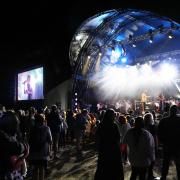It’s a decade since Amanda Mundin and Neil Roberts decided to revive the days of the picture house in Belper. Derbyshire Life celebrates the Belper Ritz, ten years on...

As the Belper Ritz looks forward to its tenth anniversary on 3rd November, co-owners Amanda Mundin and Neil Roberts have several favourite moments to look back on. One of them is a screening of The Smallest Show on Earth, a whimsical Ealing-esque snapshot of 1950s small town cinema-going. ‘The Bijou cinema in that film is just like the Ritz,’ says Amanda. Indeed it is, although maybe with one notable exception: the Ritz has happily avoided replicating the scene in the film where the alcoholic projectionist, played by Peter Sellers, showed a western flick where everything that could possibly go wrong, did, including reels being shown backwards and upside down.
That said, a similar disaster occurred at the old Belper Ritz in the 1980s. Local film student Andy Minion had a brief, inglorious stint as projectionist where, one night, he laced up The Elephant Man without rewinding it first. ‘Luckily,’ recalls Andy, ‘there weren’t too many people in to see it being shown silent and upside down.’ That same Andy Minion, who went on to gain a PhD in film history, is now part of the current Belper Ritz set-up. In stark contrast to the old days, Andy claims that the Ritz has ‘the best projection and sound I have ever come across – it even beats the National Film Theatre.’
When the Belper Ritz became, in November 2006, the first town cinema in the East Midlands to re-open, it matched the high quality of the multiplex cinemas which had previously seen off smaller town-based picture houses. Despite the romantic notion of town cinemas as palaces, many had languished as flea-pits. In a Sunday Times article ‘Cinema thrives on a complex’, Gilbert Adair pronounced that the cinemas of the 1960s ‘tended to be moth-eaten dumps, peeling and unappealing, their usherettes surly, their carpets frayed, their screens filthy.’
Even though the Belper Ritz was spruced up in 1971 when it became the first town cinema in the country to be twinned, my experience of sitting in one of the two tiny 75-seater auditoria was akin to watching a large television in an overcrowded sitting room. As current Ritz regulars Peter and Joan White reveal: ‘We rarely went to the two-screen Ritz. It was too tatty; and the walls were so thin, we didn’t enjoy listening to two films at the same time!’

Terry Cope, who had been coming to the Ritz since he was a lad in the 1940s – when there was both an upper and lower tier for 555 patrons – found the slimmed down two-screen Ritz ‘very poky.’
The arrival of the multiplexes – in 1988, Derby became the first city in Europe to house two of them – arrested the decline in cinema-going and ushered in a new age. Attendances soared. However, at the turn of the millennium, the enduring popularity of cinema saw the rebirth of town picture houses.
The story of the Belper Ritz revival involves two passionate East Midlands-based cinemagoers, Amanda Mundin and Neil Roberts, who were working together in film, television and corporate production, and decided to seek out a part-time venue to show occasional films. Amanda, who had moved to Belper, discovered that the shell of the old Ritz, originally the Town Hall and Law Court, was untouched, though access to the interior was effectively landlocked by a hair salon. As their search continued, the salon proprietor suddenly and opportunely shut up shop.
Amanda and Neil’s first site visit revealed a Marie Celeste of a cinema. ‘We discovered that the doors had literally been closed on a working cinema – only the projection equipment had been removed. It was quite eerie seeing the auditoria just as they had been left 15 years before, strewn with Butterkist wrappers, Coke cans and sweet packets, together with pigeon droppings, dust and cobwebs.’

Fate also provided Amanda and Neil with the funding they needed. After a fruitless few months of grant-seeking, their access to the cinema site coincided with the announcement of the Milford and Belper Townscape Heritage Initiative. ‘It was almost too good to be true,’ recalls Amanda. ‘Suddenly there was a pot of money available for people looking to reinstate architectural detail and utilize vacant floor space. It was a perfect moment.’ Their application was a success. Amanda and Neil then realised that this was going to be more than a part-time occupation. ‘We didn’t have a clue about cinema at all,’ admits Amanda, ‘so we went on a course on cinema exhibition. As well as giving us a valuable insight, we realised that if we were going to be a proper cinema, we had to be a full-time operation.’
The success of the Ritz is down to a combination of several significant factors. Firstly, there are the practical advantages. As Peter and Joan White explain: ‘The Ritz has enabled us to see films on a regular basis without the hassle of going into Derby or Nottingham.’ Many Ritz regulars told me that pre-Ritz they were either infrequent cinemagoers or hadn’t been to the cinema since the old Ritz closed in 1991.
Furthermore, as regular Rachel Abbot affirms, The Ritz offers ‘great value for money.’ It also provides more sophisticated concessions than a multiplex. As Andy Minion wryly puts it: ‘Instead of being charged a mortgage for an iffy hot dog and a bucket of Cola, you can go for a slice of homemade cake and a glass of wine,’ adding that the glass of wine ‘will be served by people who probably know your name.’ As co-owner Neil Roberts points out: ‘The Ritz is a wonderful example of the phrase “small is beautiful.”’
As soon as patrons enter the cinema, the Ritz offers not only a sense of occasion but also a sense of belonging. ‘It works because we are not just professional but also personal,’ declares Neil. ‘So many of our regulars have told us how impersonal they found multiplexes. Here they’ve got to know us and we’ve got to know them. That really makes a difference.’

‘The companionship, the cakes, the comfort… I adore the whole package,’ declares Ritz regular Janet McGinty. ‘I even love the Ritz’s toilets!’ she adds, alluding to the fact that they are supplied with individual towels.
The 99-seater auditorium is also spacious with lots of leg room, the chairs are comfortable – with plush luxury seats available to early bookers – and each seat has a tray to accommodate that glass of wine from the licensed bar. You can even order a bottle of white in an ice bucket. For Andy Minion, the Ritz ‘makes a night at the pictures something special once again.’ Indeed, an evening at the Ritz recalls a romantic, bygone age encapsulated in the opening lines of C. Day Lewis’ poem Newsreel:
Enter the dream-house, brothers and sisters, leaving

Your debts asleep, your history at the door:
This is the home for heroes, and this loving
Darkness a fur you can afford.
As Rachel Abbot reveals: ‘I have on occasions taken a friend with me to the Ritz when they have needed a distraction from troubling times. The cinema is a wonderful place to let your mind turn away from worries and anxieties, even if it is only for a couple of hours. Afterwards, life doesn’t seem quite so bad.’
As Amanda Mundin adds: ‘One of the highlights of my first decade here has been seeing audiences swept away by the film. You can’t beat hearing 99 people laughing together or, alternatively, seeing them in tears. Even better is hearing applause at the end of the film.’
Of course, none of this would have worked without Amanda and Neil’s astute programming. For Amanda, shrewd selection of movies has been key to the Ritz’s early and continuing success: ‘We remain true to our initial principles to screen a wide variety of good quality films. We know sometimes we could pack the place out with highly commercial movies but feel it’s important to show a wide selection.’
While the last ten years have seen popular hits like The Queen, The Duchess, Mamma Mia!, Exotic Marigold Hotel, Skyfall, The King’s Speech, Philomena and The Lady in the Van, the Ritz has also enjoyed success with more ‘serious’ fair for cineastes such as The Lives of Others, White Ribbon, The Tree of Life, Pan’s Labyrinth, La Vie en Rose, and Skeletons, the debut film of Derbyshire filmmaker Nick Whitfield.
Nick is one of several film names to have appeared in a Q&A for which the Ritz’s stage is perfect. Luminaries have included director Mike Leigh, Derby actor Jack O’Connell, Harry Potter star Ian Hart, a glamorous 83-year-old Honor Blackman who celebrated the 40th anniversary of the Derbyshire-made Virgin & the Gypsy (the Ritz Q&A is an ‘Extra’ on the film’s DVD release) and, more recently, world champion cyclist Graeme Obree who brought both his film Battle Mountain and his contraption called ‘The Beastie’ which he built to attempt the World Human Powered Speed record.
As the interviewer on all those Q&As, I would single out the appearance of rising star Jack O’Connell, who last appeared on the Ritz screen alongside George Clooney and Julia Roberts. When Jack appeared in Private Peaceful in 2012, Amanda arranged a special screening for a class at Duffield’s William Gilbert School who were studying the book and I arranged through Jack’s ‘agent’ at the time – his mum – for the young actor to make a surprise appearance. I shall never forget the youngsters’ glee and astonishment when I told them the film’s star was our special guest, along with Jack’s insistence at the end of the Q&A on having a group photo taken.
My declared interest in the Ritz goes back to the months prior to opening when I persuaded Amanda and Neil to put on Thursday morning screenings for the over-50s. The Silver Screen has become a firm feature of the cinema, generating a homely atmosphere where friendships have been formed.
There is also Ritz Recommends, screenings of classic pictures introduced by Andy Minion, who has also been behind The Ritzys, the cinema’s jocular film award ceremonies – where charities have been supported. Andy has also created several amusing short films in conjunction with Belper-based cinematographer Louis Vella which audiences have viewed before the main feature. On a night prior to a comedy film, one of Andy’s ‘shorts’ advising us to switch off our mobile phones generated more laughter than the film that followed. Add to this the satellite screenings of theatre, opera, ballet and art exhibitions and it’s no wonder that – having pulled in 50,000 cinemagoers in its opening year – admissions are as strong as ever. Standards are, too: there have been two refurbishments and the introduction of the latest digital projection and surround sound.
Amanda and Neil are insistent that their role at the Ritz is as vital to the movie industry as the films they show. As a former projectionist once told me: ‘I always used to say that Gary Cooper and I were in the same business – he makes ‘em and I show ‘em.’
This is a sentiment Amanda fully concurs with: ‘We show films how they are meant to be seen. Filmmakers can take years to bring their projects onto the big screen and it’s down to us to play our part. We are the exhibitor and we’re just as important as the actors, director, producers and writers. If any of us doesn’t do our job, we let the others down. Our audiences appreciate this, too, and that’s why when a film is on at the Ritz, you can hear a pin drop.’
The Belper Ritz has also been a vital asset to the town, helping to regenerate the top of King Street, now with thriving shops in the vicinity. ‘It serves a wide catchment area,’ states regular Terry Cope. ‘I constantly meet people in the Ritz from Matlock, Ashbourne and the other side of Derby. There’s no question that it benefits the local economy.’
Amanda Mundin has gone on to benefit the economies of Melton Mowbray and Stockport – at the same time establishing a small family empire. Buoyed by the success of the Ritz, she has re-opened the Regal at Melton and the Savoy at Heaton Moor, run by her two young sons Jacob and Louis and their wives.
Amanda’s home, though, is here at the Ritz and she still gets a buzz from cinema: ‘I will always love being transported to another land, a faraway place of wonder, illumination and inspiration… to see other people’s lives unfold in front of you, to watch actors become someone they’re not, to see a scene lit so beautifully that you could cry, to hear a score so sublime it can raise you to cheer and then plummet you into darkness. Being part of that magic is something that will always make cinema special.’
Belper Ritz Box Office 01773 822224 www.ritz-belper.co.uk



























